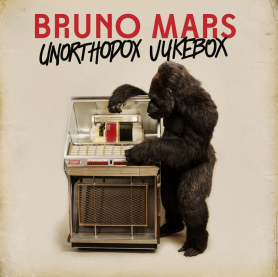By Nick Ubels (The Cascade) – Email
Print Edition: January 9, 2013
 Unorthodox Jukebox opens with “Young Girls”, a stadium-baiting declaration of intent that doesn’t lack for ambition. There’s a wall of synthesizers, glittering bells, and thundering Phil Spector drums. When Bruno Mars sings “All these roads steer me wrong/ But still I drive them all night long” it’s an earnest attempt to imbue his weirdly plastic new record with the kind of scope of a Springsteen opening track, minus the thematic weight and underlying heartache. It’s his “Thunder Road.” And good or bad, this song’s failures and strengths could adequately sum up the varied experience of listening to Unorthodox Jukebox.
Unorthodox Jukebox opens with “Young Girls”, a stadium-baiting declaration of intent that doesn’t lack for ambition. There’s a wall of synthesizers, glittering bells, and thundering Phil Spector drums. When Bruno Mars sings “All these roads steer me wrong/ But still I drive them all night long” it’s an earnest attempt to imbue his weirdly plastic new record with the kind of scope of a Springsteen opening track, minus the thematic weight and underlying heartache. It’s his “Thunder Road.” And good or bad, this song’s failures and strengths could adequately sum up the varied experience of listening to Unorthodox Jukebox.
Taken just for its stunning high points, Bruno Mars’ sophomore album, the rather, well, orthodox Unorthodox Jukebox, doesn’t want for sweeping grandeur and bold, but adamantly radio-friendly R&B digest. It’s head and shoulders above his debut, the lightweight and saccharine Doo Wops and Hooligans, which spawned a string of monster international hits including “Marry You” and “Grenade” and wooed doe-eyed listeners with his sweet, effortless charm. Mars’ talent as a performer has never been in doubt, but here he makes impressive strides forward towards the kind of universally-appealing pop he sets out to make by harnessing and streamlining some of his pop fundamentals. That said, there’s also some pretty underwhelming meandering sprinkled throughout that prevents his latest from joining the ranks of Thriller or Purple Rain, the records it most openly aspires to match.
To consider Bruno Mars is to do so on his own terms. His intention is to entertain, to endear, to charm, and to get people to move. It’s a back-to-basics approach to pop music that risks revealing a hollow centre, particularly if you take Mars’ lyrics seriously. “Locked Out of Heaven”’s groaner of a bridge (“Your sex takes me to paradise”) would be a pretty damning example if it wasn’t assuaged by the Police-inspired groove’s sharply-crafted pop hooks.
The stage name of 20-something producer/song writer/musician Peter Gene Hernández, Mars is probably best understood as a persona with his own identity crafted at some acknowledged distance from Hernández himself. The singer’s debut album, Doo Wops and Hooligans, was too cloying to gain much traction outside of the top 40 charts, but Mars digs deeper to try to produce something more timeless here.
Listening to Unorthodox Jukebox alongside the impressive roster of hit singles he’s co-written (including Cee Lo Green’s “Fuck You” and K’naan’s “Wavin’ Flag”) reveals Hernández’/Mars’ stamp on those standout, reach-for-the-rafters pop anthems. Mars knows exactly what he’s doing, and exactly how to make what he wants to make. He glides convincingly from the MJ-inspired disco-funk of “Treasure,” into the midnight confessional piano ballad “When I Was Your Man” before concluding with the shameless, throwback soul of “If I Knew.” This final track comes as a welcome surprise, bolstered by an affable Sam Cooke-esque demeanour that oozes with scrappy charm. It shows off the deep pathos Mars’ can evoke with a simple, raspy falsetto.
Mars has never been one to shy away from his influences (Elvis Presley, Prince, ‘90s R&B, dub), but the murky water of Unorthodox Jukebox can be difficult to make sense of as a single record. Some songs, the aforementioned “Locked Out of Heaven” principal among them, shine brightly in the tightly-wound, 10-track sophomore set from the Hawaiian hit-maker. Others suffer from an over-correction that tries to recast Mars as the bad ass boyfriend your parents most feared. It’s what gives “Locked Out of Heaven” its necessary edge, but more often than not, it’s more embarrassing than convincing (see “Gorilla”, “Money Maker”). Chalk it up to Mars’ musical adolescence.
What’s clear is that Mars is still wrestling with his identity as an artist. His proficiency as a musician and songwriter is a double-edged sword that allows him to do whatever he wants, seemingly with ease. Yet not having to wrestle with your songs risks making them dangerously hollow and, dare I say, soulless. It’s the same problem that hampered much of Paul McCartney’s solo work in the mid ‘80s: talent to spare, but little to fight for. Bruno Mars consistently sings like he’s got something to prove, but when it comes to writing, it feels more like a 60/40 split.


